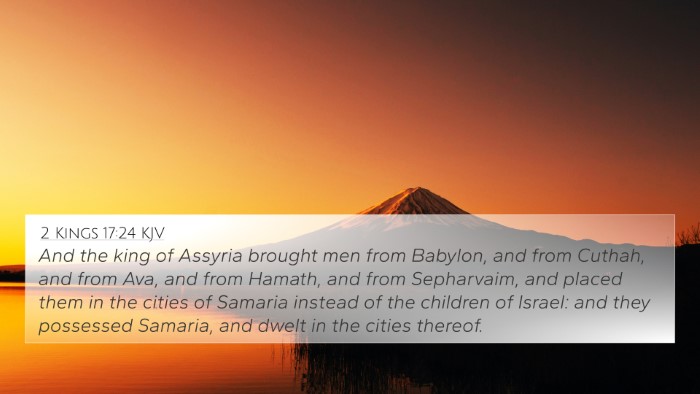Understanding Isaiah 37:13
Isaiah 37:13 presents a critical moment in the narrative of Isaiah, involving the Assyrian king Sennacherib and his threats against Jerusalem. The verse states: "Where is the king of Hamath, the king of Arpad, and the king of the city of Sepharvaim, Hena, and Ivah?" This inquiry not only serves as a rhetorical question but also highlights the defeated status of significant opponents, emphasizing God's sovereignty over nations and their rulers.
Summary of Insights
This verse can be better understood through various commentaries that shed light on its implications and thematic connections within the Scriptures.
- Matthew Henry's Commentary: Henry explains that this verse is part of the broader context in Isaiah 37, where God demonstrates His superiority over the Assyrian pride. Sennacherib's taunts and inquiries are positioned to showcase the futility of warfare against the divine will.
- Albert Barnes' Notes: Barnes elaborates on the geographical relevance of the cities mentioned, suggesting that their mention signifies the complete subjugation of those once prominent nations by Assyria, thus questioning Sennacherib's confidence and reminding him of God's power.
- Adam Clarke's Commentary: Clarke adds that these cities represent kingdoms that succumbed to Assyrian control, yet the absence of their kings in defending their territories symbolizes a greater moral lesson – the strength of earthly kings pales in comparison to the might of God.
Thematic Connections
Isaiah 37:13 evokes themes of divine authority and human pride, demonstrating how God’s will prevails over any earthly power. This aligns with numerous other Scriptures, illustrating the overarching narrative of divine sovereignty throughout the Bible.
Related Bible Cross References
- Isaiah 37:10-11 - The challenge presented to God's people, foreshadowing Sennacherib's downfall.
- 2 Kings 18:32 - A parallel account of the Assyrian threat highlighting God’s reassurance to His people.
- Isaiah 36:18-20 - Sennacherib's mockery of God and the futility of his threats against Jerusalem.
- Psalm 2:1-4 - Emphasizing the futility of nations plotting against the Lord and His anointed.
- Isaiah 40:15 - Introducing the idea that nations are like a drop in the bucket to God.
- Daniel 2:21 - God’s sovereign control over kingdoms and their rulers.
- Romans 8:31 - Assurance of God's support against any opposition.
- Revelation 19:16 - Christ as the King of Kings emphasizing His superiority over earthly rulers.
- Jeremiah 10:10 - The Lord as the true God, unlike the idols of the nations.
- Psalm 46:10 - God’s call to be still and recognize His sovereignty.
Conclusion
Isaiah 37:13 is rich with meaning, illustrating not only the historical context of Assyrian oppression but also serving as an important reminder of God's ultimate authority over human affairs. The questioning of Sennacherib prompts believers to contemplate their trust in God amidst adversity, and the interconnectedness of Scripture enriches this understanding through cross-references and parallels throughout the Bible. For deeper study, employing tools for Bible cross-referencing can enhance one's grasp of the text by illuminating thematic connections that resonate across different books and passages.









